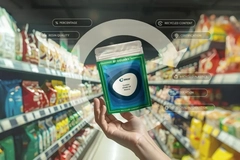Bacardi, Eco Spirits and Carnival Cruise Line partner to introduce closed-loop glass packaging for cruise industry

31 Aug 2023 --- Bacardi is initiating a pilot for closed-loop packaging of its rum designed explicitly for the cruise industry through a collaboration with Carnival Cruise Line and circular economy technology company Eco Spirits.
The three-month pilot will determine if reusable containers, the Eco Tote 3.0SC Cruise Edition, can serve Bacardi rum on Carnival ships, reducing single-use packaging by 95%. The concept will be tested on three ships operating from Miami, US: Carnival Celebration, Carnival Horizon and Carnival Sunrise.
Each Eco Tote reportedly replaces approximately four bottles of Bacardi Superior rum, and each one can be used, cleaned and refilled 100 times, creating a closed-loop system. The companies detail that within this pilot phase, approximately 9,400 bottles will be replaced with the Eco Spirits system.

The rum will be transferred from Eco Tote to serving format using Eco Spirits Smart Pour technology. New silver and red Bacardi-branded Smart Pours will be placed in select bars on the three ships for beverage team members to serve.
 Each Eco Tote reportedly replaces approximately four bottles of Bacardi Superior rum.Closed-loop glass packaging
Each Eco Tote reportedly replaces approximately four bottles of Bacardi Superior rum.Closed-loop glass packaging
Eco Spirits’ Smart Pour technology is a digital spirit dispense system that pairs with Eco Tote. These Wi-Fi-enabled pouring units can dispense rum from an Eco Tote directly to the serving glass or cocktail shaker or refill a branded spirits bottle.
“A Smart Pour can be paired with an Eco Tote by cutting the tamper-evident seal on the Eco Tote and placing the Smart Pour over it,” details Paul Gabie, CEO at Eco Spirits.
Gabie further tells Packaging Insights that to develop the specialized Eco Tote 3.0SC version for use in the cruise industry, Eco Spirits worked with Carnival Cruise Line experts to identify material and design upgrades required for the maritime environment and to comply with the US Public Health hygiene regulations.
“These upgrades include enhanced salt corrosion resistance through black aluminum anodizing, as well as specialized fasteners for improved hygiene and ease of cleaning,” he states.
“In celebration of this pioneering partnership, the parties are also funding the Eco Spirits Oceans Program, which will recover more than two pounds of single-use plastic, glass and other man-made wastes from endangered marine environments for each Eco Tote delivered to a Carnival ship during the pilot program.”
Maritime circularity
The companies chose to pilot with the Bacardi rum because it is among the most-ordered spirits across the fleet and a staple ingredient in some craft cocktails. Eco Spirits’ Smart Pour technology is a digital spirit dispense system that pairs with Eco Tote.
Eco Spirits’ Smart Pour technology is a digital spirit dispense system that pairs with Eco Tote.
The Bacardi collaboration with Carnival Cruises and Eco Spirits comes as the company continues to seek out all opportunities to reduce packaging waste across its portfolio, on track with its target of removing all plastic from its secondary packaging and point-of-sale materials by the end of 2023.
“Innovating in closed loop packaging has been a top priority for us for several years, so launching our very first Eco Tote for Bacardi rum on a Carnival cruise ship and seeing the doors this trial will open is an exciting step forward in that journey,” says Rodolfo Nervi, vice president of Global Safety, Quality & Sustainability at Bacardi.
Currently, Carnival recycles single-use glass items. Each ship in the fleet is outfitted with a recycling center, where crew members sort paper, plastic and glass recyclables. Last year, Carnival processed more than 11 million pounds of recyclables.
“As we continue to work toward our sustainability goals, the collaborative work of our beverage team, Eco Spirits and Bacardi, is a great example of thinking in ways that are out-of-the-box, or in this case – out-of-the-bottle, to develop new partnerships and practices that further our ongoing efforts,” remarks Zachary Sulkes, senior director of beverage operations at Carnival Cruise Line.
By Radhika Sikaria












